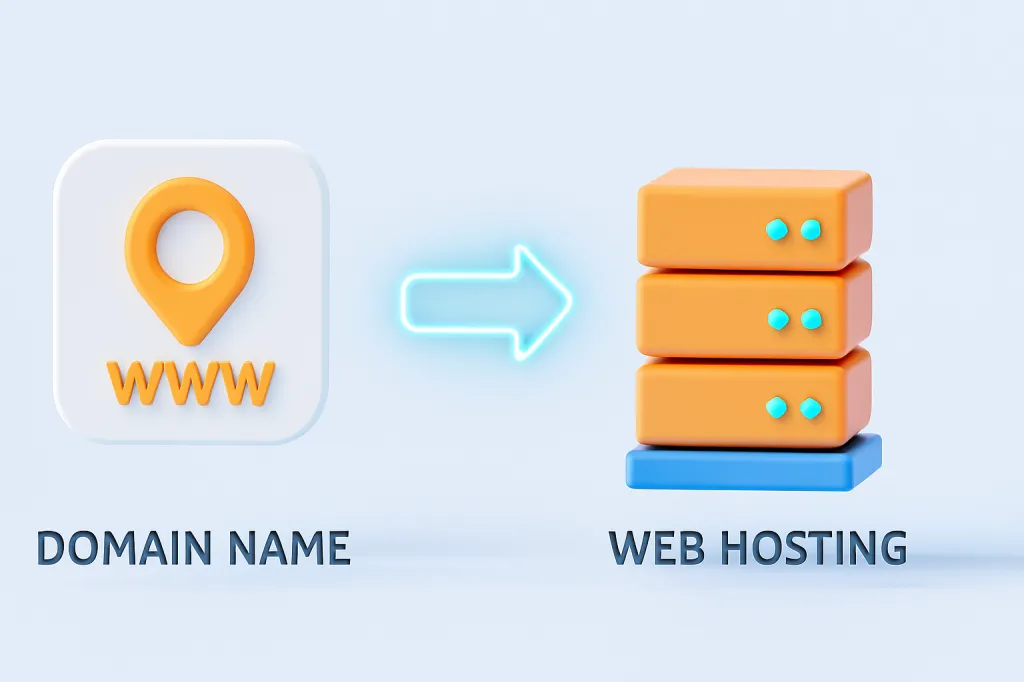When you're starting your first website, the terms "domain name" and "web hosting" are two of the first you'll encounter. For beginners, it's incredibly common to confuse the two or even think they are the same thing. Understanding the distinct roles they play is the first fundamental step to building a presence online.
Think of it this way: if a website is a house, the domain name is the address on the mailbox, and web hosting is the actual plot of land and the house itself. You need both to have a functioning home that people can find.
This guide will break down these two essential components in simple terms, explaining exactly what they are, how they work together, and why you can't have a website without them.
What Is a Domain Name? 🏠 (The Address)
A domain name is the human-friendly address that people type into their browser to visit your website. For example, the domain name for this site is startwithsite.com.
Computers on the internet don't use names; they use a series of numbers called an IP address (e.g., 192.168.1.1). A domain name is simply a memorable, easy-to-type alias that points to that specific IP address. It's much easier for someone to remember "https://www.google.com/search?q=google.com" than it is to remember "142.250.204.78".
- How it works: You register a unique domain name through a company called a "domain registrar" (like Namecheap, GoDaddy, or Google Domains).
- Cost: You pay a yearly fee to keep the registration active. This fee gives you the exclusive right to use that name.
- Examples:
.com,.org,.netare called Top-Level Domains (TLDs). There are hundreds of TLDs to choose from.
What Is Web Hosting? 🌳 (The Land & House)
Web hosting is the service that provides the physical space on a server to store all the files, data, and content that make up your website. It's the "house" where your website "lives."
When you create a website, you have many files—code, images, text, videos, and a database. These files need to be stored on a powerful computer (a server) that is connected to the internet 24/7. When someone types your domain name into their browser, their computer connects to your hosting server, and the server sends your website's files back to them to be displayed.
- How it works: You rent space from a web hosting company (like Hostinger, Bluehost, or Cloudways). They provide the server, technology, and support to keep your website online.
- Cost: You typically pay a monthly or yearly fee for this rental service.
- Types: There are different types of hosting, like Shared, VPS, and Cloud, which offer different levels of resources and performance.
How Do They Work Together?
A domain name and web hosting are two separate services, but they work hand-in-hand. Without both, you cannot have a live website.
- You register a domain name (your address).
- You purchase a web hosting plan (your land and house).
- You then tell your domain name where your hosting is located. This is done by updating the domain's "nameservers" to point to your hosting provider.
When a visitor wants to see your website, this is what happens behind the scenes:
- Step 1: They type your domain name (
www.yoursite.com) into their browser. - Step 2: The browser sends a request to the global Domain Name System (DNS), which acts like the internet's phonebook.
- Step 3: The DNS looks up your domain, finds the IP address of your hosting server associated with it, and sends it back to the browser.
- Step 4: The browser connects to your hosting server and requests your website's files.
- Step 5: The server sends the files, and the browser displays the website to the visitor.
As you can see, if you only have a domain (an address), there's no house to show. If you only have hosting (a house), no one has an address to find it.
Do I Have to Buy Them from the Same Company?
No, you don't. You can buy your domain from one company and your hosting from another. However, for beginners, it's often much simpler to get them from the same place. Most web hosting companies also act as domain registrars, and many offer a free domain name for the first year when you purchase a hosting plan. This is a great way to simplify the setup process.
Conclusion
Understanding the difference between a domain name and web hosting is a fundamental concept for anyone entering the world of websites. Just remember the simple analogy:
- Domain Name = Address
- Web Hosting = House
By securing both, you've taken the first and most important step on your journey to building a successful online presence. ✅





